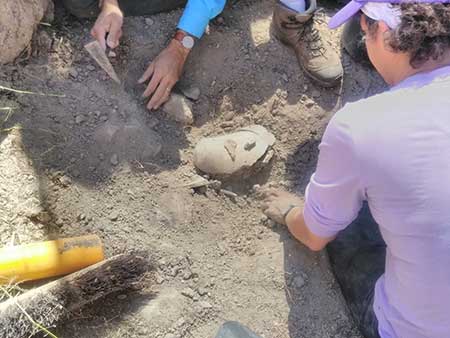Religious studies PhD candidate explores the rituals of menstruation

Photo courtesy of pexels.com
Menstruation may be a taboo topic to bring up in social settings, but it happens to roughly half of the population of the world. Every culture has their own way of discussing, portraying and handling it, but what can these rituals tell us?
That question is exactly what religious studies PhD candidate Isobel Johnston is looking to explore. After three years as a stay-at-home mother, she returned to school to pursue her lifelong interest in religion and culture.
Johnston wanted to study Jewish menstrual rituals, but she struggled at first to find a university that supported her project’s concurrent topics in religion and anthropology — until she landed at Arizona State University. Her own encounters with these rituals are what led her to pursue the research.
“My personal experiences observing these rituals through childbirth, pregnancy loss and the ups and downs of early married life had suggested that this ritual area offered rich material for academic study from multiple perspectives,” said Johnston.
Along with the intersection of anthropology and religion, her research is contributing to women and gender studies to provide an “alternative analytic framework for approaching traditional menstrual practices.” She hopes her findings will contribute to the deconstruction of mainstream American menstrual politics, particularly how those politics were applied to Jewish menstrual rituals.
“Dreaming big, I see my work contributing to the formation of a theoretical foundation of anthropology of menstruation to emerge as its own subfield,” said Johnston.
The chair of her dissertation committee, Associate Professor of religious studies Joel Gereboff, sees the combination of Johnston’s research important to gaining meaning in historical and modern contexts.
“Analyzing the connections between use of mikveh, ritual immersion, observance of laws of purity speaks to broader issues of the ways in which, over the centuries and in contemporary times, Jews — men and women, though in diverse ways — have understood such issues as the nature of the body, sexuality, gender roles and the spiritual meaning of these matters.”
Her preliminary research started last spring when she reached out to Jewish communities in the greater Phoenix area with a survey to establish a baseline of actual menstrual practices across the Jewish communities. The survey was sent through Jewish women’s Facebook groups, as was the recommendation from several local rabbis.
“I am working with two locally based Jewish organizations to review the data and determine what lines of follow-up qualitative research will serve the interests of these organizations and their communities.”
The two organizations Johnston has partnered with are Rising Tide Open Waters Mikveh Network and the Women’s Jewish Learning Center.
“These partnerships will define a significant part of my dissertation research,” said Johnston. “So far, the data supports that traditional Jewish menstrual practices are observed outside of the Orthodox Jewish community and that there may be some interesting intersections with alternative concepts of body and health related to alternative medical practices and ritual healing.”
Along with her own research, Johnston has recently made it a priority to attend professional conferences in her field to help her network with others. Over the summer she attended the Biennial Conference of the Society for Anthropology of Religion on a research grant from the School of Historical, Philosophical and Religious Studies.

Program co-director Elisheva Baumgarten and a visiting colleague unearth an almost complete urn in Bet Shemesh, Israel.
“[I] indulged in attending panels,” said Johnston. “I attempted to get a broad sense of the diverse currents in the anthropology of religion.”
The Center for Jewish Studies also granted her the Great Students Graduate Fellowship to attend the Jewish Studies Advanced Summer School at the Hebrew University in Jerusalem for a week over the summer. She learned about current work in the field, went on an archeological tour of the Israeli Supreme Court, was introduced to the National Library and the resources it offers and went to an archeological dig at Bet Shemesh.
Her expanded knowledge from her summer of travel and research propelled her into the school year. Although she is not traveling as much in the near future, Johnston plans to focus on developing her prospectus.
More Arts, humanities and education

Pen Project helps unlock writing talent for incarcerated writers
It’s a typical Monday afternoon and Lance Graham is on his way to the Arizona State Prison in Goodyear.It’s a familiar scene.…

Phoenix civil rights activists highlighted in ASU professor’s latest book
As Phoenix began to grow following WWII, residents from other parts of the country moving to the area often brought with them Jim…

Happy mistake: Computer error brings ASU Online, on-campus students together to break new ground in research
Every Thursday, a large group of students gathers in the Teotihuacan Research Laboratory (TeoLab) in the basement of the…

